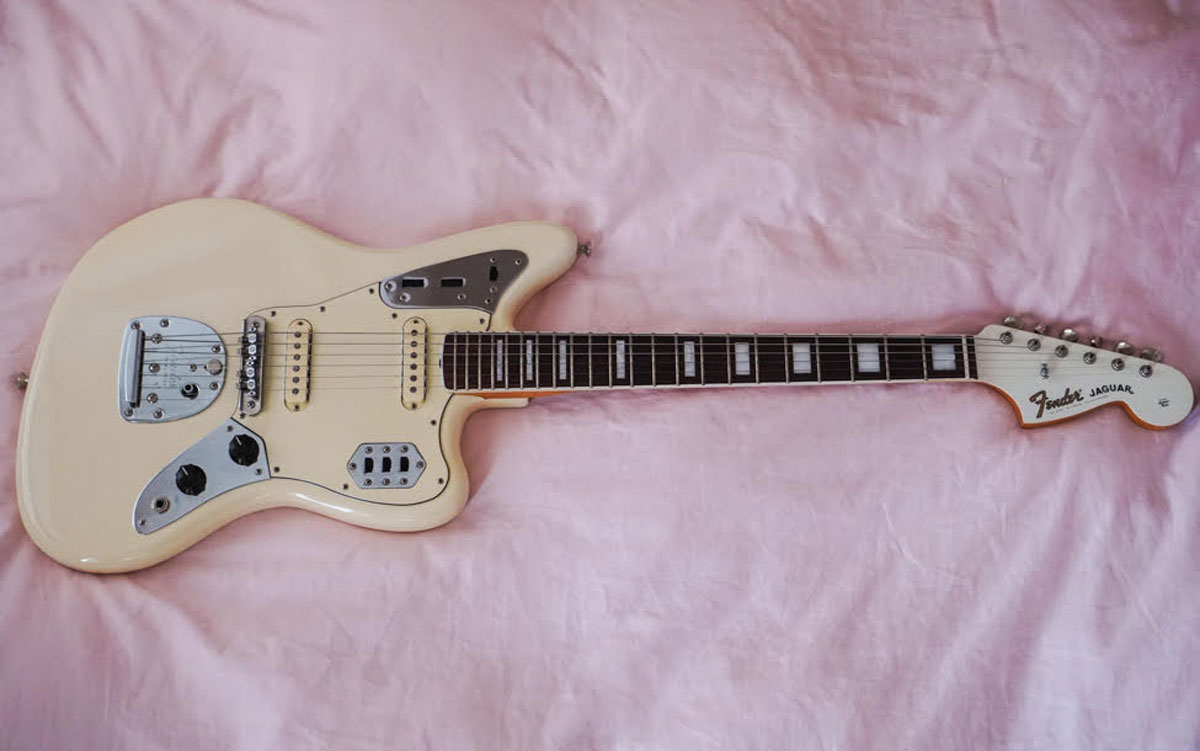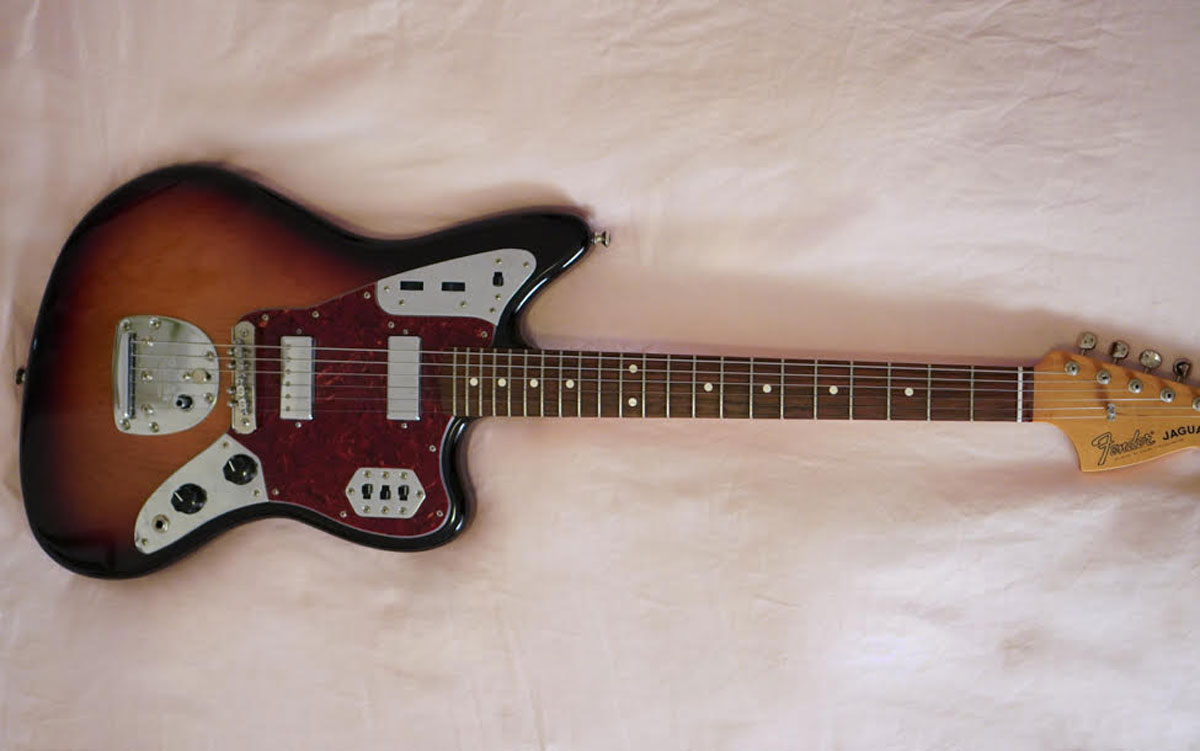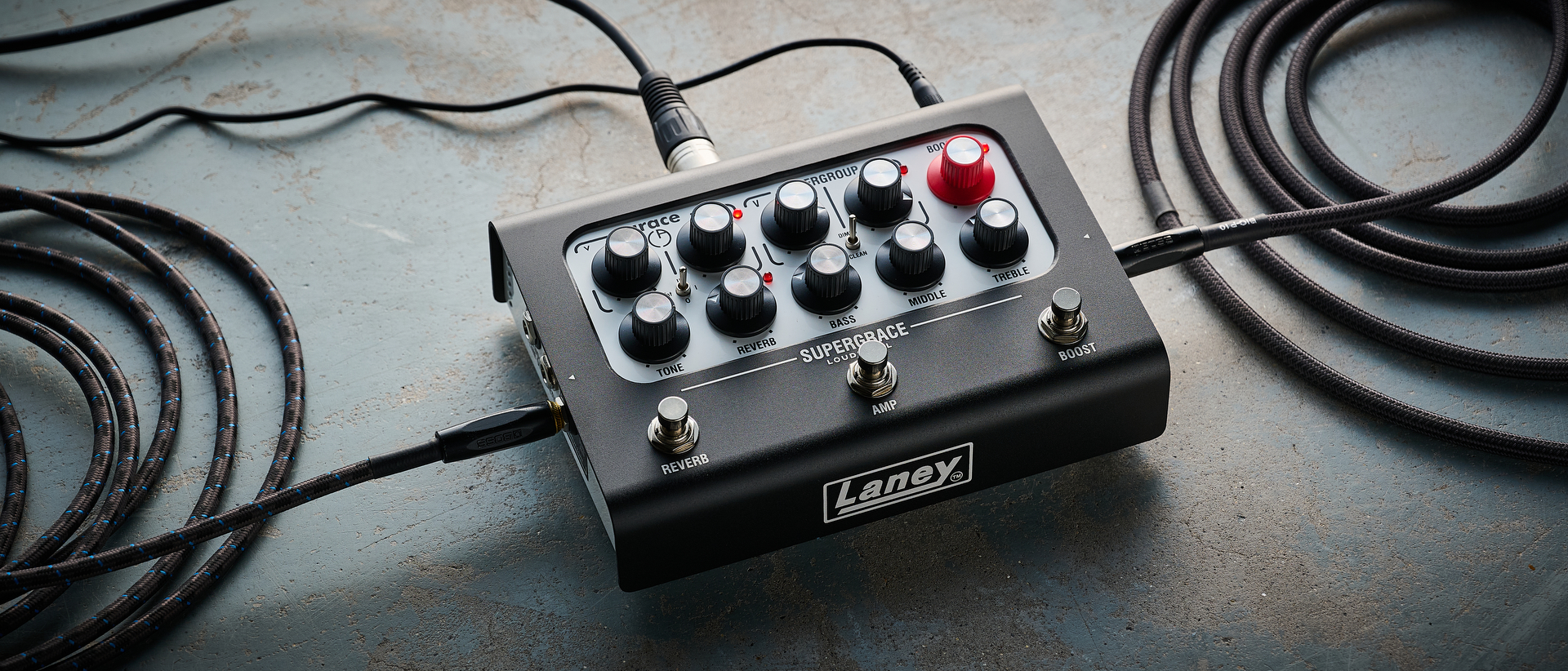Miss Grit: “Plugging into effects pedals and making weird sounds is a big part of my songwriting process”
Margaret Sohn talks her favorite stompboxes, rare Fender Jaguars and conquering self-doubt with new EP, Impostor

All the latest guitar news, interviews, lessons, reviews, deals and more, direct to your inbox!
You are now subscribed
Your newsletter sign-up was successful
Margaret Sohn, AKA Miss Grit, has just released a new EP, Impostor. After 2019’s debut EP Talk Talk earned favorable comparisons to the likes of Nilüfer Yanya and St. Vincent, it is – with knowing irony – the sound of an artist cutting her own path.
Across the six songs it melds airy melody, ricocheting delays and bitcrushed riffs, all the while deconstructing the impostor syndrome that dogs us all as musicians – and has haunted Sohn for fair chunks of her life.
Sohn, by her own telling, grew up feeling somewhat out of place. As a Korean-American in the whitewashed Michigan suburbs, she found a home in the music her Dad blasted from the basement. Talking Heads, Led Zeppelin, The Cure all poured into hungry ears.
The guitar soon followed and she started playing aged six, delving in and out classical guitar lessons, studying Music Technology at NYU and eventually evolving the textural, adventurous playing style that has come to mark out her music as Miss Grit.
We spoke to Sohn about the gear behind her masterful tones, building pedals and how she’s finally come to terms with being ‘a real musician’.
You learned to build pedals as part of a program at school. What did that involve and what drew you to that?
“I just have a love for effects pedals and I'm really drawn to just experimenting with them. It’s a really big part of my songwriting process too, just plugging into effects pedals and making weird sounds.
All the latest guitar news, interviews, lessons, reviews, deals and more, direct to your inbox!
“I studied Music Technology at NYU which is kind of like an umbrella major and there's a bunch of different paths you can take with it. I was really drawn to guitar effects pedals and I guess that was my second dream apart from being a musician full-time.
“I just really wanted to go to an effects pedal company and try to work for them. It's something that I really love doing and can picture myself doing for a long time.
“Unfortunately, it's a hobby that takes a lot of time out of you so I haven't really been as dedicated to it lately… songwriting and producing has kind of taken over. It really helped out my technical side.
“When you're producing that type of knowledge can take you really far and can help you along. Just being able to work Pro Tools or Ableton is a huge creative advantage because it really helps your workflow and creates a lot of different opportunities for you. Just having the technical knowledge makes the translation from your ears to on paper a little bit easier.”
You were saying before about how a lot of songs start on the pedals – are you one of these people who loves to find a texture and build from there?
“I think my songwriting definitely just responds best to textures and tones so it's like something that can really help the process. I think production and songwriting for me tend to go hand in hand or as some people may be like 'production and mixing go hand in hand.'
“I think songwriting is something that I just can't help but include in the production and pedal side… I think that's a big part of my attraction to some musicians, the types of textures they have.
I use my pedalboard for production sounds so I'll throw my vocals or synths through it too and that's something that's really fun to do
“Obviously St Vincent with her guitar but also LCD Soundsystem – I'm really obsessed with their synth tones and I think that that my ear automatically goes to synths and guitars in music.
“Usually my music first comes out like that then later if an acoustic performance comes up, I have to figure out the acoustic version of it whereas for some song writers I feel like it might be the opposite way around.”
Tell me about your pedalboard. Do you use many of your own builds?
“Not too many of my own creations have made it to the level where I can actually use them [live]! The couple of pedals that I have made don't have enclosures or anything so they're just wires on a board right now and in the DIY phases.
“The pedals I use that are on my board right now that are my favorites are the Meris Ottobit Jr. and the Caroline Shigeharu pedal. One of my secret weapons is the Boss PS-6 Harmonist, I have two of those on my 'board.
“The Merris Ottobit pedal is definitely my favorite. It has a great bitcrusher sound and the filter on it is amazing. It also has a sample rate knob and then the bottom half of the pedal, it makes glitchy sounds, so there's a sequencer or stutter mode. It's actually great to use with synths as well.
“That's what I do a lot – I use my pedalboard for production sounds so I'll throw my vocals or synths through it too and that's something that's really fun to do.”
What is it that you like about the Caroline Shigeharu pedal?
“Yeah, I have two different Caroline pedals. The Shigeharu is like a fuzz pedal and it just has a really great sound to it. I've been using the Death By Audio fuzzes for a long time but I find that they're always so hard to tame, which I kind of love because they're so crazy. But when it comes down to playing live, I don't want to screw up people's ears, so I feel like the Caroline fuzz is much easier to get under control.”


Tell me about the rest of your gear. Is that a Fender Jaguar with mini-humbuckers I spotted in your pictures?
"Yeah! I have two different Jaguars right now. That Jaguar was the first electric guitar I ever bought, so it came with humbuckers at first – it's the Classic Player, I think. I bought it when I wasn't that knowledgeable about guitars so I figured out along the way that humbuckers weren't my thing and I decided to try out a mini-humbucker on the neck, and then a Firebird pickup on the bridge.
“I guess that it was a cheap guitar so I just thought I'd experiment with that, so I got these Lollar pickups and it actually sounds pretty nice direct, which I like. It's especially nice because I'm just working in my room right now and I can't use an amp in my apartment building so, just using it DI has been really nice.
“Then the other one is a Ken Custom Jaguar. I think there's only 150 that have been made [in 2013 as a limited run signature for Japanese rock band L'Arc-en-Ciel's guitarist, Ken] but it's this all-white Jaguar with these white block in-lays and the white headstock, which I love.
That's my one blind spot – amps. I'm a little lost when it comes to amps just because I think I've just really grown to like direct and the DI sound
“I'm just a sucker for matching headstocks to the body and that has the classic wiring with the rhythm and lead. That's my go to for playing out. Or it was when concerts were a thing…”
What else is in that signal path for you? Do you go DI when you play live?
"Yeah, I think maybe that's my one blind spot – amps. I'm a little lost when it comes to amps just because I think I've just really grown to like direct and the DI sound. Usually live I'll just play whatever the venue has, but in my chain right now at home I'm just going through this 1073 BAE preamp and then into my Apollo interface.”
Let's talk about the new Impostor EP. What are your favorite guitar moments on there?
“There's a song called Don't Wander on the EP– it's the first track on it. That was a song that I was really pleased with and it really heavily features the Meris Ottobit and it has a bunch of glitchy, bitcrushed tones on it that I really like. It was just something that came really organically to me.
“I got into a good flow for that song while writing it and it just came really quickly and easily. They're definitely the most satisfying songwriting moments. The song Impostor I'm also happy with.
“I came up with the guitar line first and then built the song around it. Also just the ending, it goes into this acoustic section that just felt really nice to round the EP out with. I think those are kind of some nice moments for me.”
The EP focuses on the idea of impostor syndrome. Supposedly, one of the best ways to tackle impostorship is to acknowledge it as a universal experience, to name it – and that deprives it of its power. Were you aware of that principle of acknowledging it to dispel it, when you decided on the course of the Impostor EP?
“I think, subconsciously, that was the main goal. All I could think about was being an impostor and not being a real musician at the time and it basically affected every aspect of my life.
“Writing the EP about it and just making sure I was slowly becoming aware of all these different ways that it's affected me and it's just being more aware of it and being able to put a name to it and identify it is super helpful in getting over anything, I think.
“[Before it was like] this feeling that there's this big secret that you're not in on and everyone else has it all figured out and they have they key to success or something.”
Have you found yourself discussing impostorship with other musicians?
“Oh yeah, definitely. My close friend Nicole [Rodriguez], who's in Pearla, we bond over it a lot. It's just funny how us musicians can just make up these narratives that are absolutely crazy, like we just kind of forget that we actually write our own music and that music does come out of us.
We all have our low points where we're like 'I can't write music! I'm not a musician! I don't know how I'm going to write another song again!'
“We tend to think that 'magic' happens and then we have our low points where we're like 'I can't write music! I'm not a musician! I don't know how I'm going to write another song again!'
“I think that quarantine has kind of helped me with that, because I feel like so many musicians are letting you in a little bit and they're more vulnerable during this time with everyone.
“Even just seeing a musician's demo is really helpful for me because I know their finished product that they're showing everyone didn't happen at first and all at once, it was something that was really worked hard on, it's not just something that comes so easily to them.”
I think it's related to this idea that we don’t progress in linear fashion. That what feels like a step back is not a failure – progress is a zigzag on an upward curve. I think when musicians share that, it's really helpful.
“Totally. I forget if it was Tame Impala or Thom Yorke who said this but they said each time they sit down to write a song, they get this feeling like they forgot how they wrote all their other songs. They feel like they'll never be able to write a new song again and it happens every time they sit down to write!”
Not to badmouth my brethren, but journalists can't help but compare artists to each other and I imagine that won’t help impostor syndrome. How do you react to writing about you?
“I think, yeah, maybe I can't escape the St. Vincent ties – everyone seems to be writing about that. I think impostor syndrome sneaks in a little bit there, you know like you always want to be unique and create something special but I think everyone just has to remember that every new thing or new take on anything comes from inspiration and it comes from what's happened before. I think just remembering that is helpful for me.”
Relatedly, the press release mentions how you were previously being more comfortable letting others define “who I’m supposed to be” – and trying to break out of that pattern. What has helped you to do that?
“I think just creating this kind of moniker for myself, Miss Grit, has been the most helpful for me just because I'm really able to separate myself, like Margaret and Miss Grit.
“I'm able to, not live a double life, but maybe step into the Miss Grit identity without worrying about people crossing over Margaret's identity with Miss Grit. I think Miss Grit has kind of empowered me to maybe take charge of my own identity a little bit better.”

Matt is Deputy Editor for GuitarWorld.com. Before that he spent 10 years as a freelance music journalist, interviewing artists for the likes of Total Guitar, Guitarist, Guitar World, MusicRadar, NME.com, DJ Mag and Electronic Sound. In 2020, he launched CreativeMoney.co.uk, which aims to share the ideas that make creative lifestyles more sustainable. He plays guitar, but should not be allowed near your delay pedals.



